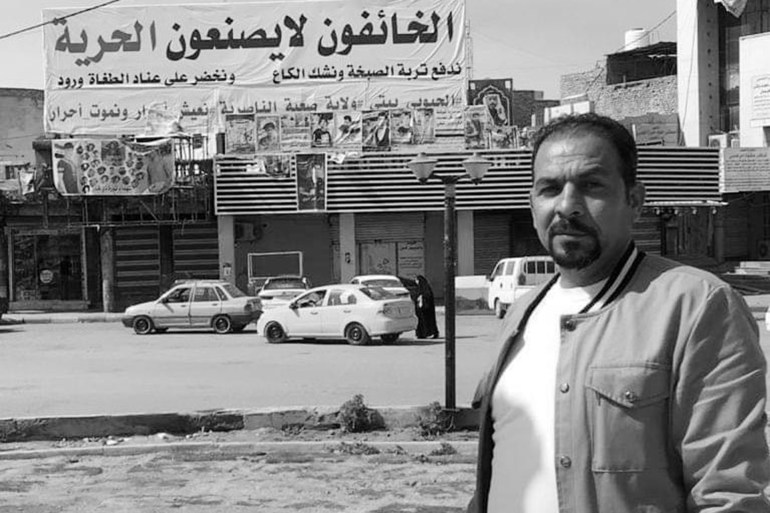There were conflicting reports about why the Iraqi security forces arrested the leader of the Popular Mobilization Forces, Qassem Musleh, at dawn on Wednesday, while Reuters quoted security sources as saying that the arrest came under the anti-terrorism law, the French Press Agency quoted a high-ranking security source as arresting Musleh for accusing him of assassinating activists.
The security sources explained to Reuters that the arrest of Muslih came after his involvement in several attacks, including recent attacks on the Ain Al-Asad air base in Anbar Governorate (western Iraq), which hosts US forces and other international forces.
For its part, the French Press Agency quoted a high-ranking security source as saying that Mosleh was arrested on charges of assassinating activists in the southern city of Karbala.
As for Anadolu Agency, it quoted a security source as saying that the reason for the arrest of Muslih was on charges related to financial corruption.
Social media circulated a copy of the arrest warrant for Muslih, and his authenticity was confirmed by security sources who stated that he was arrested under the Anti-Terrorism Law, without giving further information.
The security forces arrested Musleh, the commander of the Popular Mobilization Operations in Anbar, in an unprecedented step that comes the day after a demonstration in Baghdad and other governorates ended with the killing of at least demonstrators and wounding dozens.
Following the arrest, the Popular Mobilization Authority issued a statement vowing that Musleh would be released in the coming hours, and "the commission will deter those trying to mix the papers."
Security alert
Following the announcement of the arrest of Muslih - who is originally from the city of Karbala - the authorities closed the Green Zone in Baghdad - which is the area where state institutions and many embassies are stationed - completely due to threats from armed factions to retaliate for the arrest of Mosleh.
And strict security measures were imposed in anticipation of any emergency, against the backdrop of the arrest of Musleh, as another senior security source stated.
A security source explained to the French Press Agency, saying, "We had initial clues about the party carrying out the assassinations, and after these leads were collected, we made sure that this person was behind the criminal operations that targeted activists."
This is the first time that the arrest of an official of this level in the Popular Mobilization Authority, a coalition of armed factions and part of the Iraqi armed forces, has been announced, and is subject to the prime minister in his capacity as supreme commander of the forces.
The assassinations - which have targeted activists since the start of the "Hirak" movement in October 2019 - are often attributed to armed factions loyal to Iran.
The source said that the agency executing the arrest operation is the anti-corruption committee in the intelligence agency, whose mission is to arrest senior officials involved in corruption cases.
The security source spoke of tension and caution, in anticipation of an escalation or reaction by those factions that are trying to pressure the release of Musleh.
Al-Wazni was assassinated on May 9, near his home in Karbala (communication sites)
Ihab Al-Wazni
On May 9, unknown gunmen assassinated the head of the Coordination of Protests in Karbala, Ihab Al-Wazni, near his home in Karbala.
The assassination of Al-Wazzani sparked angry protests in several regions of Iraq - including Karbala, Dhi Qar and the capital, Baghdad - that lasted for days.
Wazni is one of dozens of activists who were killed at the hands of unknown gunmen since the protests began in October 2019, and they are still continuing in a limited way after they stopped for months due to the outbreak of the Corona pandemic, and they succeeded in overthrowing the previous government headed by Adel Abdul Mahdi.
According to government statistics, 565 protesters and security personnel were killed during the protests, among them dozens of activists were assassinated by unknown persons.
Protests
In response to these assassinations, Baghdad witnessed, on Tuesday, a demonstration in which thousands participated, which began peacefully before turning into clashes between riot police and demonstrators.
The demonstration aimed to pressure the government to complete the investigation into the assassinations, for which the authority promised to prosecute the perpetrators, but the promises did not translate into action.
The demonstration ended with the killing of at least two and the wounding of dozens.
Following the Tuesday demonstrations, Prime Minister Mustafa Al-Kazemi pledged to open an investigation "into the truth of what happened in the last moments of the liberation demonstration to uncover the circumstances."

